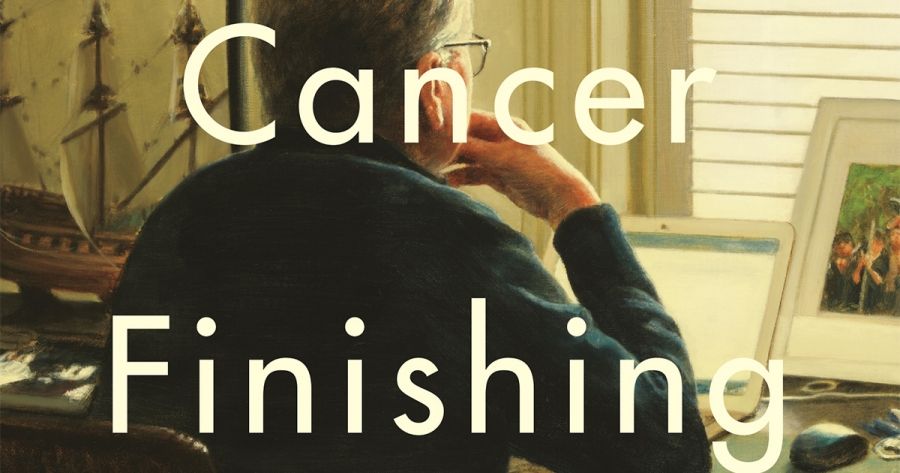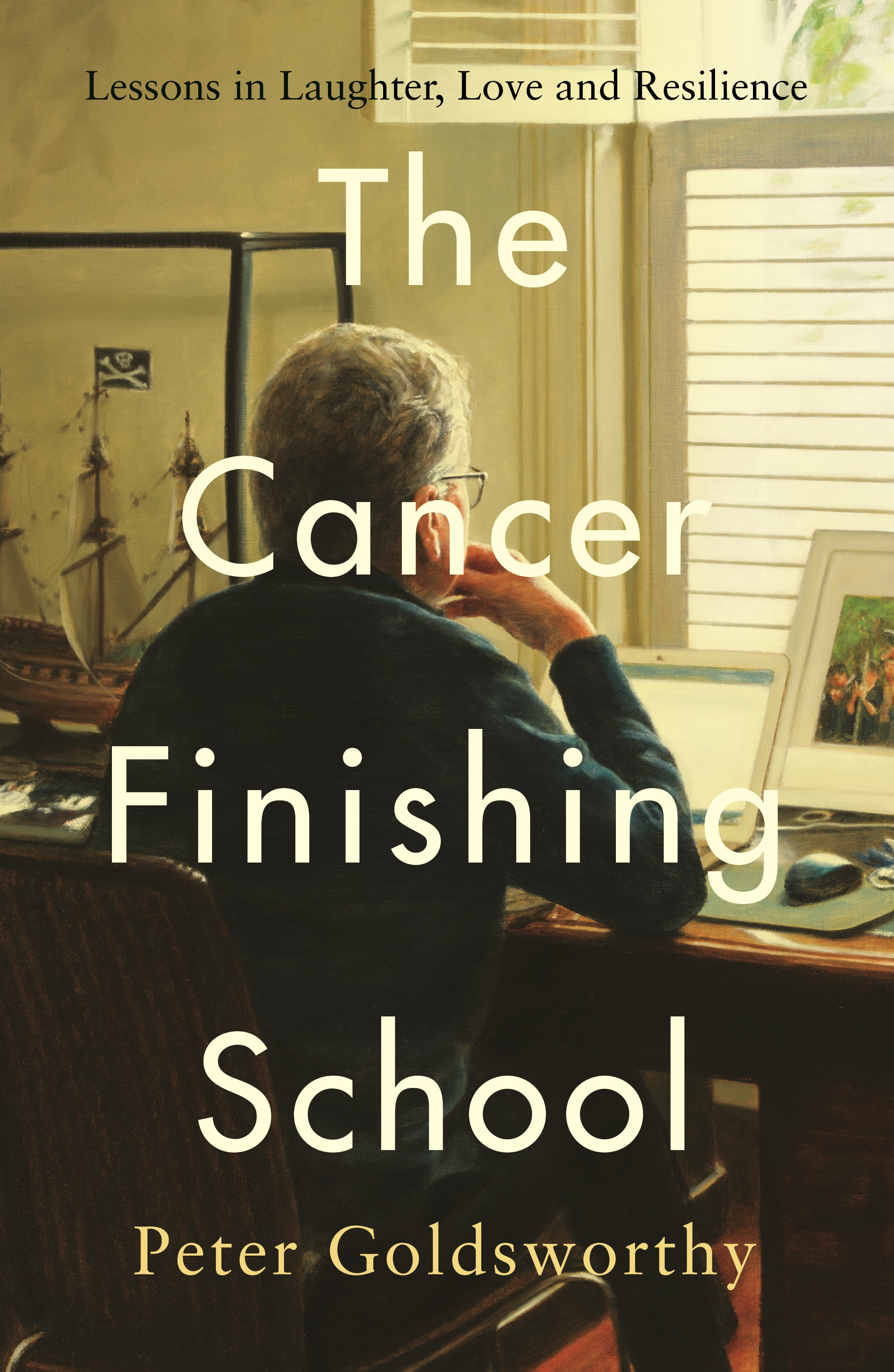
- Free Article: No
- Contents Category: Memoir
- Review Article: Yes
- Article Title: It might be …
- Article Subtitle: P is for Peter, physician, patient, poet
- Online Only: No
- Custom Highlight Text:
That doctors aren’t supposed to become incurably ill is something their patients might say, and about as useless as declaring that dentists are forbidden from contracting toothache or that undertakers should live forever – seeing other people out, not themselves.
- Featured Image (400px * 250px):

- Alt Tag (Featured Image): Michael Shmith reviews ‘The Cancer Finishing School: Lessons in laughter, love and resilience’ by Peter Goldsworthy
- Book 1 Title: The Cancer Finishing School
- Book 1 Subtitle: Lessons in laughter, love and resilience
- Book 1 Biblio: Viking, $36.99 pb, 336 pp
- Book 1 Cover Small (400 x 600):

- Book 1 Cover (800 x 1200):

Instant denial, Goldsworthy recalls, was followed almost immediately – in the time it took him to limp to a nearby newsagent to buy a lottery ticket; he won precisely $17.35 – by elation. ‘It feels as if I both have cancer, and don’t, simultaneously,’ he writes, presciently adding, ‘My first stray thought: cancer is a gift. I might be lucky to have it. What priceless material for a doctor-writer!’
Soon enough, strictly clinical common sense prevailed. With test results confirmed, nearest and dearest informed, specialist consulted, and treatment organised, Goldsworthy had the beginnings with which to write about his condition. ‘Does the world need yet another book about cancer?’ he asks. Well, yes. As he points out, getting it down on paper was a combination of self-therapy and ‘special to me, if not yet stamped urgent’. It was also a significant advance beyond Goldsworthy’s own arch seventeen-syllable summation:
If you want to write
A memoir, please consider
A haiku instead.
In fact, The Cancer Finishing School is much more than a memoir-treatise. It is a disarmingly honest, often graphic, but endearingly positive journey that, like a Glenelg tram, takes its time to trundle along destiny’s tracks, with (one can only hope) a long time yet before it reaches the terminus. Goldsworthy, writing in the chapter ‘Year Zero’ of his stem-cell transplant, puts it more succinctly:
My future hangs in the balance; my fate is being weighed. Will I be granted a pardon, or at least a leave-pass from this incurable disease for another decade?
[…]
I do believe in hope. Writing a happy ending is permitted, therefore, but less as a kind of positive voodoo magic than as plain useful optimism.
Along the way, Goldsworthy expands and enlivens his narrative by bringing in many of the cast who populate his multifarious existences. Whizzing round in this literary centrifuge are many family members, including his wife Lisa, children Anna, Alex, and Daniel, several grandchildren, and various friends and colleagues, plus a litany of Goldsworthy’s patients, long-past and still-present, whose own illuminating experiences and tales form ‘a treasure trove of mental medical files scattered across the messy seabed of my head’. The patients function as a sort of Greek chorus to the action: an important part of the story, yet also peripheral in terms of anonymity. Identities are carefully concealed or even combined, but presented by the ever-precise Goldsworthy in rough alphabetical order – although one patient, ‘G’, ‘wouldn’t stand for Gaylene, but after some negotiating, consented to Gemma’.
Also in the amalgam are some fictitious characters from the past, introduced by Goldsworthy, often to identify, challenge, and elaborate on his own perceived professional shortcomings. Thus a sequence in Uncle Vanya, by his great literary and medical forebear, Anton Chekhov, in which Dr Astrov recalls a persistent memory of one of his patients, who died during surgery. This triggers Goldsworthy’s recollections of his late patients, especially one, Paula, who, years before, had died suddenly, even before he had the chance to counsel her on the true severity of her illness. This, in turn, brings in the spectres of W.H. Auden’s tragic Miss Edith Gee, whose doctor remarked, ‘Cancer’s a funny thing’, and Henry Purcell’s Dido, who lamented ‘Remember me. Remember me. / but ah! Forget my fate.’ Goldsworthy’s self-diagnosis, ‘the memories we truly need are still there’, is bolstered by an additional thought that, rather than the long-dead, ‘it’s my living, breathing family of patients I am about to lose, then slowly, inevitably forget’.
This is a truly sad moment, when, earlier on, Goldsworthy realises he will have to stand back from his practice – for his own good as well as the continuing welfare of his patients, that ‘part of a very big, very extended adopted family’. I hope it’s not giving too much away to reveal that ‘Doctor Pete’ does, in fact, return to work, as a bare-headed, skeletal version of his former self who requires long consultations to bring his once-again regular patients up to date.
Then, a few months later, it’s 2020 and Goldsworthy’s hair has regrown to almost Afro luxuriance. Covid sweeps in, along with extended lockdowns and meetings on Zoom. Then, before we know it, it’s October 2021, and Lisa throws Peter a seventieth-birthday party. After which, we accelerate into the present, and, almost miraculously, remission – at least for the time being.
‘I’ve tried to live the past three years unbothered by the disease and its various remedies, but it has provided the controlling framework of my life,’ Goldsworthy writes in the closing pages, in the chapter ‘Lessons Learnt’. He reflects on dying, but also on beauty and on love: ‘I need love to survive.’
It is, thank heavens, premature to describe this book as Goldsworthy’s epitaph. Better, I think, to say it’s the work of a lifetime; one sustained by inexhaustible knowledge from the creative and medical sides of Goldsworthy’s brain and leavened by his equally honed curiosity and wit. He writes in the unmistakable voice of the poet, with cadences and dramatic pauses you can almost hear. Actually, you can: The Cancer Finishing School is also an audiobook, narrated by the author. I plan to listen to it at once.


Comments powered by CComment